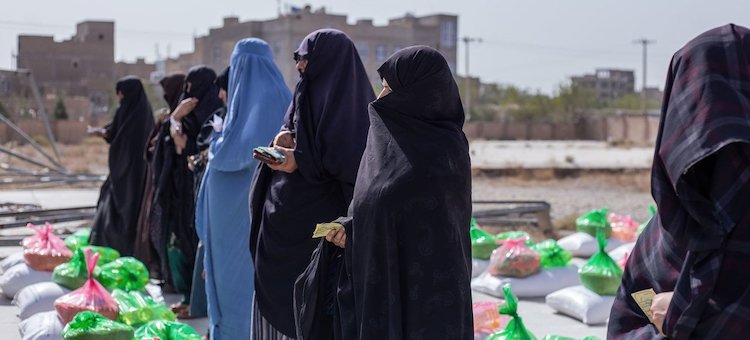Jamshed Baruah
GENEVA (IDN) — UN experts are warning that Afghanistan’s future is bleak if more is not done to reverse the deteriorating human rights situation, particularly for women and girls. They call on the international community to intensify efforts to urge de facto authorities to adhere to basic human rights principles.
It has been one year since the takeover of Afghanistan by the Taliban. At that time, UN experts called on the international community to take stringent actions to protect Afghans from human rights violations, including arbitrary detention, summary executions, internal displacement, and unlawful restrictions on their human rights, in particular those most likely to be affected such as women and girls and vulnerable citizens, people with disabilities, human rights defenders, journalists, artists, religious and other minorities, educators and civil society actors.
“Regrettably, there is little or no sign that the human rights situation is turning a corner, the UN experts aver in a statement on August 12. “Indeed, the daily reports of violence—including extra-judicial killings, disappearances, arbitrary detention, torture, heightened risks of exploitation faced by women and girls including for the purposes of child and forced marriage, and a breakdown in the rule of law—gives us no confidence that the Taliban has any intention of making good on its pledge to respect human rights.”
The experts add: “After a year of waiting for the Taliban to respect human rights and being misled by their false promises, it is time to rapidly step up efforts to ensure accountability for violations of international human rights law and humanitarian law. Impunity will only lead to further violations and deterioration of the human rights situation in the country.”
While seeking international recognition and legitimacy, the de facto authorities continue abusing almost all human rights standards. Most recently, the experts say, “we have witnessed that the Taliban appear to have been harbouring the leader of Al Qaeda. That said, the recent US drone strike also raises concerns of a violation of international law”.
The UN experts call on the Taliban to:
- Abide by all international human rights and humanitarian law obligations and commitments incumbent upon Afghanistan, fully implement the human rights standards that Afghanistan has freely accepted, including respecting the rights of girls and women to education, employment, and participation in public life, upholding the rights of persons belonging to minority communities, and constructively engaging with human rights mechanisms.
- Immediately open all secondary schools for girls and restore their access to quality education, lift the restrictions imposed on women’s mobility, attire, employment and political participation and immediately cease all acts of violence against them.
- Respect the general amnesty and immediately stop all reprisals against members of the former government’s security forces, other officials and civil society, especially human rights defenders, including women.
- Allow free, unhindered access for human rights monitors and humanitarian actors throughout the country to sensitive locations and all places of detention.
- Immediately reinstate the Afghanistan Independent Human Rights Commission, the bar associations, and other relevant unions, and allow them to operate freely and independently.
They call on members of the international community to:
- Ensure that civilians have equitable access to humanitarian aid and that the humanitarian community works with women and minority groups to ensure aid reaches those most in need.
- Support the mandate of the Special Rapporteur on Afghanistan to report on the human rights situation, document violations with a view to accountability and advocate with the Taliban and the international community to ensure that the human rights of all Afghans are respected. This should include support for collaborative work with other relevant mandate holders, especially those focusing on women’s rights.
- Support ongoing initiatives of Afghan women leaders and thinkers, as well as civil society groups, including women human rights defenders, to design and implement – under Afghan women’s leadership – a strategy to promote the rights of women and girls, with clear benchmarks and expectations.
- Maintain and/or adopt sustained and robust humanitarian exemptions within all international and domestic sanctions regimes to ensure international human rights and humanitarian law compliance. Such measures should be fit for purpose, ensure that sanctions do not interfere with protected humanitarian action under international law, and function to remediate the current humanitarian crises and prevent sanctions from continuing to exacerbate the humanitarian and human rights crises faced by the Afghan people.
- Adopt measures that would pave the way for Afghanistan’s economy to recover.”
The Special Rapporteurs, Independent Experts and Working Groups are part of what is known as the Special Procedures of the Human Rights Council. Special Procedures experts work voluntarily; they are not UN staff and do not receive a salary for their work. They are independent of any government or organisation and serve in their individual capacity. [IDN-InDepthNews – 14 August 2022]
Photo: Women receive food rations at a food distribution site in Herat, Afghanistan. © UNICEF/Sayed Bidel
IDN is the flagship agency of the Non-profit International Press Syndicate.
This article is published under the Creative Commons Attribution 4.0 International licence. You are free to share, remix, tweak and build upon it non-commercially. Please give due credit.

